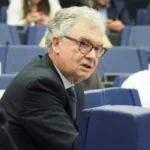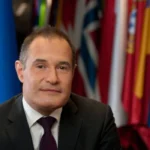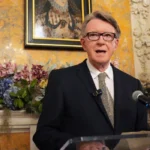Belgium’s former head of the Central Office for the Repression of Corruption (OCRC), Hugues Tasiaux, has been officially charged with breach of professional secrecy in connection to leaks related to the high-profile Qatargate investigation. The charge was confirmed by the public prosecutor’s office on September 5, 2025, marking a significant development in a case entwined with allegations of political corruption and foreign influence within the European Parliament.
Background of the Investigation and Charges
Tasiaux, who served as the interim head of the OCRC for eight years until his replacement in spring 2025, became the focus of an investigation following a complaint by former Member of the European Parliament (MEP) Marie Arena and her son Ugo Lemaire. The complaint accused Tasiaux of leaking confidential information connected to the ongoing Qatargate probe. This scandal centers on attempts by Qatar and Morocco to exert undue influence and corruption within European political circles.
On February 6, 2025, Belgium’s General Inspectorate of the Police and a Brussels investigating judge conducted searches at Tasiaux’s home and at the OCRC offices. Tasiaux was subsequently taken into custody by federal police for questioning, though he was later released. The searches and interrogations underline the gravity of allegations that professional secrecy was violated.
The Qatargate Scandal and Related Leaks
Qatargate remains one of Belgium’s most sensitive and politically charged investigations. It initially surfaced after accusations emerged that foreign actors, particularly from Qatar and Morocco, attempted to corrupt parliamentarians to sway policy decisions. The scandal drew escalating public and media attention, especially after investigators found 280,000 euros in cash at the residence of Ugo Lemaire, son of Marie Arena, linking the issue to suspected money laundering and corruption.
The leak of sensitive information to the press severely compromised the investigation’s integrity, making the alleged breach by Tasiaux especially significant.
“The ongoing investigation concerns not only leaks in the Qatargate case but also other cases,”
said sources familiar with the inquiry. This broad scope indicates that the breach of secrecy might have wider implications beyond the initial scandal.
Political and Institutional Impact
The unfolding of events has triggered political ripples, given the involvement of former Socialist MEP Marie Arena and the high-profile nature of the allegations. Arena was questioned earlier in 2024 but was not charged immediately. She has faced accusations of membership in a criminal organization, though not on corruption or money laundering charges directly.
Inside the Belgian anti-corruption office, concerns emerged in late 2024 about management practices that may have compromised investigative independence. Investigators complained about the requirement to obtain senior management approval before filing police reports with prosecutors, raising fears about potential interference with sensitive investigations. Some saw this as an attempt to shield certain cases from proper scrutiny.
The political ramifications extend beyond Belgium’s borders due to the European Parliament’s involvement, highlighting how international corruption investigations can challenge legal and political systems.
Legal and Procedural Context
The charge of breaching professional secrecy is a serious offense under Belgian law, emphasizing the importance of confidentiality in ongoing judicial and police inquiries. The prohibition on leaks serves to protect investigations from being derailed by premature public disclosures or political interference.
Tasiaux’s charge reflects Belgium’s commitment to uphold the rule of law and tackle corruption, even when it implicates senior officials in anti-corruption bodies. His role at the OCRC—a federal unit dedicated to fighting corruption—makes the allegations particularly troubling.
Statements and Reactions
The public prosecutor’s office confirmed the charges against Tasiaux, signaling the case will proceed through the courts. While Tasiaux has not made a public statement, insiders suggest the defense may argue that information sharing was done in good faith or within legal boundaries.
Marie Arena and Ugo Lemaire, as complainants, have underscored the necessity of safeguarding investigation secrecy to ensure justice and prevent political manipulation.
The case also reflects wider challenges in combating international corruption, particularly in politically sensitive contexts. Belgium’s top prosecutor recently called for increased resources to tackle such complex, multinational corruption cases effectively.
The indictment of Hugues Tasiaux for breaching professional secrecy marks a critical juncture in the ongoing Qatargate investigation. It underscores the challenges faced by anti-corruption agencies operating under intense political and public scrutiny. How the Belgian judicial system handles this case will be closely watched as a measure of the country’s resolve in maintaining transparency, justice, and the rule of law amid allegations that touch the core of European political integrity.







